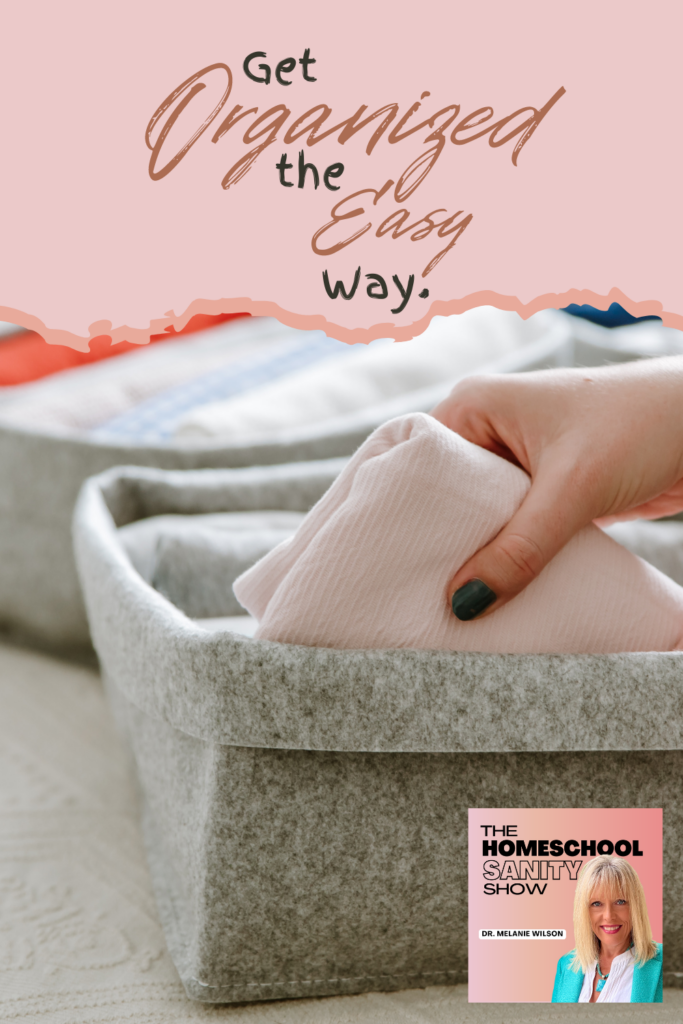Does organizing or staying organized seem hard? It did for me. This is the Homeschool Sanity Show, the episode where I share the easy way to get and stay organized.
Hey, homeschoolers! If you've heard any of my organizing episodes before, you know that I was so disorganized that I felt I couldn't homeschool without having division of family services come in. Not only was my house a mess but I wasn't actually teaching my preschooler. He was my proving ground and I proved to myself that I could not do it!
That was when I found FLYLady online and discovered the power of routines. Routines changed my life and gave me the confidence I needed to keep homeschooling and even have three more children. Routines–a string of habits regularly done in the same order–provide the structure that we need to keep up our homes, care for our kids, and homeschool. They also make organizing possible.
But organizing, even with routines in place, can seem hard. Perhaps you have a part of your routine dedicated to organizing. But instead of decluttering and making access to things easier, you choose to do something else. You might decide to fold the laundry, clean a window covered with fingerprints, or scan Pinterest for organizing hacks instead of actually organizing. Why do we do this and how can we fix it?
Before I share the easy way to get organized, I want to admit that I can easily fall into the hard way of getting organized, too. When I do, I don't want to organize. At all. Allow me to describe the hard way that has me wanting to do anything but get organized.
Organizing the Hard Way
The hard way requires a decision on every item in the space. Have you ever had to complete one of these long, legal documents for an expensive product or service you're purchasing? It has a dozen options that you haven't researched. So you have to look to the sales rep for an explanation and a recommendation for each. The worst is when the sales rep shrugs and says it's up to you. This is how we can feel when we're faced with a space full of items. Should you get rid of it? Move it? Buy an alternative to it? Ask someone if they want it? Sell it? Take a picture of it or record yourself explaining the significance of the item before you let it go? What kind of organizing system should you use for storing it? What options are available for that? Will you use it again? When? How often will you use it and does that frequency justify keeping it? That decision fatigue plus any emotion the item brings up can be exhausting with just one item. I feel stupid for buying it. I feel guilty for buying it. I remember the person who gave it me and I feel sad or angry. I wonder if that person will ask about it if I let it go. No wonder we want to avoid this process! Therapy would be easier.
The hard way also means perfectly following the plan. I love the decluttering missions from Home Storage Solutions 101. So many times I've started the new year telling myself that I'm going to do the missions on the day they're planned. Then I get to “create tax organizer for current tax info.” I see the word tax and I'm more interested in cleaning the toilet. I tell myself I can do tax stuff later. What I really mean by that is when my husband says our accountant needs all our tax stuff this week or else. So I skip it for now.
Then when I'm supposed to take decluttered food to the food pantry according to the plan, I think, “I don't even know where to take it! Is this a big enough donation to drop off? Shouldn't it be better food than the lima beans I didn't eat? Should I buy some food to add to this? And it's raining. Hard. I don't know where my umbrella is. I'll do it another day.” Then I've already failed. I didn't do the tax system or the food donation, so now I can't win in the game of “do everything in my decluttering plan when scheduled this year.” I quit using the plan because it's simply a reminder that I've failed. Again.
The third way to make organizing hard is by doing it alone. If I'm alone when I make the decisions, I don't know if my husband needs something in the space. I'm stuck. If I ask him to join me, he will likely just say “keep!” without considering the 25 options I described earlier that are clearly required before making a decision. When you have young kids, you can declutter their toys and clothes without them, while fretting that they will describe this trauma to their therapist one day. “My mom threw out my prized possession, the object I would take with me in case of fire, without even thinking to ask me. And this is why I can't take care of myself today.” We compare this nightmare scenario to the certainty of asking your child about an object and knowing the answer will be “keep!” when it should be tossed or “Get rid of it” when it should be kept. We default to doing it alone in response and feel frozen, so we don't do it at all.
We also default to doing it alone because we are too embarrassed to ask for help. We won't let anyone see how much stuff we have or how much a mess it's left us in. We don't want to see the shock on a friend's face or to be gossiped about. Better to just handle it ourselves. Doing it ourselves is also a punishment. “You've made your bed, now lie in it.” We'll have to do it all ourselves, though we have likely had help from others in creating the clutter. But when it comes time to do it, we'd rather delay that punishment. Of course! Asking for professional help in terms of an organizer or therapist is out of the question. We don't think we're bad enough to need a professional; we can't afford it or don't want to spend the money on our own failure; or we want to do the work ourselves first. Then the professional won't think we're so bad.
The hard way is deciding on every item perfectly and alone. Have you tried organizing the hard way? I have. So what's this easy way I speak of?
Organizing the Easy Way
Only make the easy decisions now. I love that Dana White advises us to eliminate the trash first. If you have difficulty parting with trash, you must consult an expert on hoarding. This advice won't help you. But apart from that, make decisions on the obvious items. If you have some principles to guide you, you'll have more easy decisions. For example, my guideline is that clothing that needs repair goes. Why? Because my history is that I don't repair clothes. I just buy new. What if I have an exception? I do have one right now. The sleeve of a favorite top has come loose and can be easily stitched up. I'm not deciding on it now. It's not an easy decision. I intend to stitch it. But when I am decluttering in the future, I will see if I've stitched it and if I am still wanting to wear it. If no is the answer to both, the shirt will go. If I gave the shirt away now, I would have some angst about it. So it stays. Easy decisions on decluttering or locations or organizing schemes shouldn't give you anxiety or have you waffling. The decision should be quick and unemotional. Again, if every decision is lengthy and emotional, you'll need help from a professional. But most people can make quick decisions on some items.
When making easy decisions, you can either leave the questionable items where they are (as I did with my shirt in my closet), or you can put them in a maybe box. The option you choose should not make you anxious. If putting something in a box stresses you out, keep it where it is.
The next easy way to organize is to see the plan as a buffet. Take from it what you want, without even considering that you'll take it all. You'd be hospitalized trying to eat every item on a buffet. Instead, you'd likely choose some things from the salad bar, a main dish option or two, a side or two, and a dessert or two. If it's a really good buffet, you'll go back for seconds. But you don't consider yourself a failure for not eating every item.
Let's apply this analogy to an organizing plan. I have an organizing plan in The Organized Homeschool Life. There is an area of your life to organize each week. Within that area, there are four 15-minute missions. If you tell yourself that you will do every mission every week, that's the hard way, and you will fail. The easy way is to choose the areas that would make the biggest difference to your life. The easy way is to choose one area a month to focus on. The easy way is to choose one mission in that area to complete a week. The easy way is to do just 5 minutes instead of 15.
But won't that be pointless, you may ask? No. It's amazing what you can accomplish in just 5 minutes that would improve your life. I have cleaned out many a drawer that was giving me fits in just 5 minutes. Even if you do no more than 5 minutes of organizing a week, you'll have more sanity. But the odds are good that you'll see the benefits of decluttering and organizing and want to do more–more than you'd want to do if you told yourself that you have to follow the plan perfectly.
When you are making the easy decisions and treating your organizing plan like a buffet that offers small samples to enjoy, you are organizing the easy way. But you can also do it the easy way by organizing with others. Before you object and say that you have no one who would want to come over to help you, let me tell you about how I decluttered a huge stash of books. I know, letting go of books is heresy. But I'm married to a book salesman and I was keeping a mental health library for eternity. It needed to be trimmed. While I was decluttering, I was on the phone with a friend who lived out of town. I have no idea if she was even listening to me, but as I told her why I was keeping a particular book, the answer became obvious to me. “A friend gave this to me…and I haven't read it and don't want to, so why am I keeping it?” It was so much easier to trim my book collection this way. It was almost fun!
I can guarantee that you also know people locally who love organizing. They not only love it but would be energized by helping you and would not judge you or gossip about you. Pray about this and talk about one of your organizing dilemmas. See who says they would love to help you. If you would feel better about it, offer one of your gifts in return. You could teach her child a skill, babysit, make her a meal, etc. You can also ask someone to be your accountability partner. My friend and I are doing one thing a week to get organized and are reporting it to each other when we get together.
There are also professional organizers who are worth paying. They are really no different than hiring a carpenter to work in your home. These people have seen it all and will likely tell you that you're not as much of a disaster as you think. Consider the value of having an objective, experienced person help you simplify your life. Ask your friends for a referral.
Then realize that there is tremendous value in working through the family issues that keep you working alone. Things got very testy when I organized the garage with my husband. But we needed to resolve the conflict instead of ignoring it. One of the best ways to do that is to be clear about what you need instead of attacking the other person's character.
Kids also have to be taught to declutter their belongings. If we don't teach them, it can become a lifelong struggle with marital conflict of their own. The container concept is an easy way of teaching kids. They can keep as many toys as comfortable fit in a box or a closet and no more. Instead of starting with the trash with this kind of organizing, have them choose their favorite belongings. Whatever space is left is available for second-tier belongings.
I had the biggest challenge decluttering toys with kids of different ages. I solved it by putting blankets on the floor–one for giveaway, one for trash, and one for keep. As an older child put a toy he enjoyed when he was younger on the giveaway blanket, a younger child could rescue it for the keep blanket. As we continued going through toys, I was amazed to see my kids move things from keep to giveaway. They needed time to let go and they had the modeling of the kids who weren't as attached to toys. If you have just one child, you can do this with them. Put the items on the giveaway blanket that you think should go and let your child put it on keep. Once it's on keep, let it be your child's decision to let it go. Another time it may be an easy choice but it isn't now.
Yet another option is to have your child sort items to a maybe blanket. Those items can be boxed up and kept. If your child asks for an item within a certain time frame, retrieve it. Otherwise, let them go without mentioning it to your child.
Conclusion
If you make the simple decisions about what to declutter, use an organizing plan your way, and you get help from friends, family, or a professional, you'll be organizing the easy way. I hope you'll let me know how it goes.
Have a happy homeschool week!



